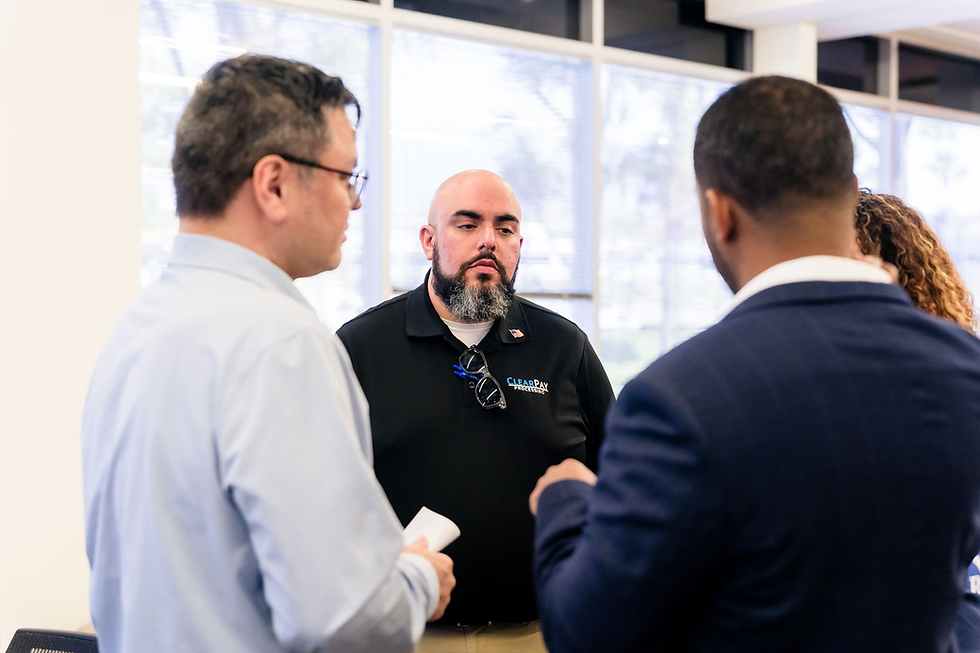Bridging Finance & Community GeeGoals Hosts Revenue and Capital in Times of Uncertaint
- Daily Network
- Jun 18, 2025
- 3 min read

A Platform Launch and a Broader Financial Conversation
Hosted in partnership with Eagle Community Credit Union, the event aimed to provide a timely platform for addressing how businesses can access and manage capital, navigate economic shifts, and connect with responsible financial resources. The event also marked the launch of the GeeGoals platform, a new financial matchmaking tool designed to connect small business owners with lenders and advisors through a tailored, industry specific approach. While the platform is open to all businesses, it places particular emphasis on supporting immigrant owned enterprises, which often face cultural and systemic challenges when navigating lending systems.
The platform’s creators emphasized the importance of offering tools that reflect the diverse needs of business owners across industries and backgrounds. The approach is informed by the understanding that while entrepreneurship is global, access to capital is often not evenly distributed something the platform hopes to address.
Exhibitor Contributions Tools, Resources, and Opportunity
The event also showcased a range of exhibitors whose services and presence offered direct value to attendees
Costco Wholesale provided insights into large-scale procurement systems and partnership opportunities, giving attendees a clearer picture of how small businesses can work with corporate buyers.
Royal Business Bank offered information on inclusive lending practices and banking services designed to serve diverse communities and small enterprise clients.
Andrew Cordero, whose photography captured the day’s highlights, helped document the moments of collaboration and insight that defined the event.
Other exhibitors included financial advisors, insurance specialists, and community development lenders, each contributing to the event theme of navigating capital with clarity and resilience.
Key Themes Financial Access, Strategy, and Community Collaboration
Among the standout sessions was a keynote by Ashten Barber of Eclipse Financial Advisors, who addressed the realities of capital access, sustainability, and risk management in today’s business climate. Other sessions explored the dynamics between banks and small businesses, strategies for navigating lending processes, and tools to improve long term financial health. The tone of the day was both candid and collaborative. Attendees noted how the event allowed for open conversations between businesses and financial professionals, encouraging mutual understanding and shared problem solving.

Economic Conditions Continue to Challenge Capital Access for Small Businesses
One of the recurring themes throughout the “Revenue and Capital in Times of Uncertainty” event was how today’s broader economic climate is limiting the ability of many companies especially small and immigrant owned businesses to raise or secure capital.
As interest rates remain elevated, and lending institutions tighten underwriting standards, access to affordable credit is becoming more selective. Even businesses with strong revenue and growth potential are finding it difficult to secure the funding they need to scale or stabilize operations. Lenders, reacting to economic volatility, are placing greater scrutiny on credit risk, documentation, and industry-specific performance.
This trend disproportionately affects immigrant entrepreneurs and minority owned businesses, who may not always fit conventional financing models due to differences in credit history, business structure, or cultural approaches to finance.
In addition to lending hurdles, tariffs and trade uncertainties have added another layer of complexity. Companies reliant on imports, particularly from countries with fluctuating trade policies, are seeing increased costs and reduced profit margins directly impacting their financial forecasting and capacity to reinvest or expand.
For many small businesses, especially those operating with thin margins, tariffs on raw materials or imported goods can have an immediate impact on cash flow. In sectors such as food distribution, manufacturing, and electronics, these pressures are forcing companies to re-evaluate supplier relationships and pricing strategies, which further complicates access to capital. These overlapping challenges tight lending, inflationary pressure, and geopolitical trade shifts underscore the need for more adaptive financial tools and education. Events like this summit are serving a critical role in helping business owners understand the terrain, access reliable resource, and build strategic partnerships in an increasingly uncertain economy.
A Step Toward Inclusion and Practical Support
With positive feedback from attendees and strong engagement from exhibitors and speakers, the event underscored the need for continued dialogue on financial inclusion and responsible capital access. Events like this help foster a financial ecosystem that is more responsive to the realities faced by small business owners especially those navigating the system as first-generation entrepreneurs or those new to U.S. lending structures.
By bringing together people from across the lending, business, and nonprofit sectors, the event helped shine a light on both the opportunities and the gaps that still need attention.



Comments